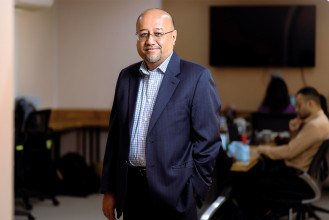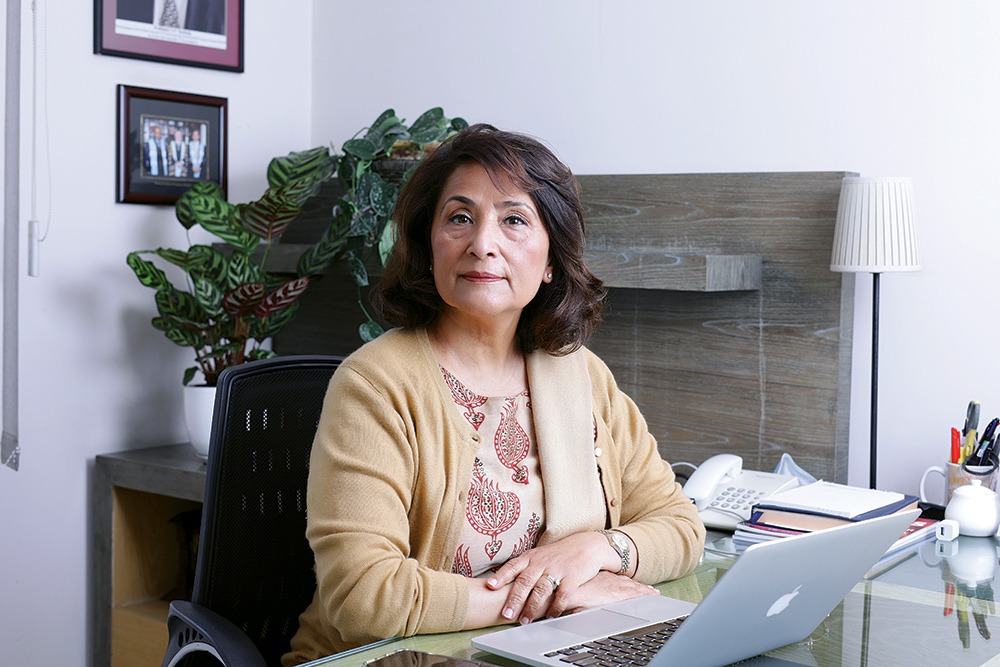
Prof Dr Madhu Dixit Devkota, Executive Chairperson, Upendra Devkota Memorial – National Institute of Neurological and Allied Sciences
It is never easy to live someone else’s legacy because it is never about you. What’s even more challenging is when you are representing that person and giving continuity to their dream. But that is exactly what Prof Dr Madhu Dixit Devkota has been doing for the past four years. As the Executive Chairperson of Upendra Devkota Memorial – National Institute of Neurological and Allied Sciences, every day is a challenge for her “because the bars that were set by my husband, late Dr Upendra Devkota, are so high there is very little room to make mistakes.” Dr Devkota admits that having to prove oneself on a daily basis can be really stressful but then again smiles, “What is life without challenges,” adding, “When my husband passed away most people didn’t believe we would be standing here at this moment as the very same institute.” She acknowledges it was but natural for people to have doubts initially because she was representing a person considered to be the country’s best neurosurgeon who did even the smallest of things with great finesse. “There is a very thin line between challenge and opportunity and you need to be able to differentiate that,” she states, “When fate pushed me to get involved at this institute on a full-time basis looking after all the management details, I did feel challenged but I was never overwhelmed.” Though Dr Devkota has been a part of the management team at UDM-NINAS since its inception, she never was fully engaged here. Prior to taking on the responsibility of the Executive Chairperson, she was not only a professor of public health but also Assistant Dean at the Institute of Medicine, Tribhuvan University. “I was associated with Institute of Medicine, Tribhuvan University ever since I returned to Nepal after my studies and joined the hospital as a medical officer,” she recalls. It was only after her husband’s demise that Dr Devkota resigned from the Institute of Medicine to devote her time to the institute that has set a benchmark in neurological sciences in Nepal. At present, providing the best possible medical services is the only thought that consumes her, shares Dr Devkota. She counts herself to be lucky to be supported by an able team of doctors, nurses and healthcare providers who espouse the institute’s vision. “We all believe in trying to make a difference to the lives of our patients and their families by offering them the best care that we can.”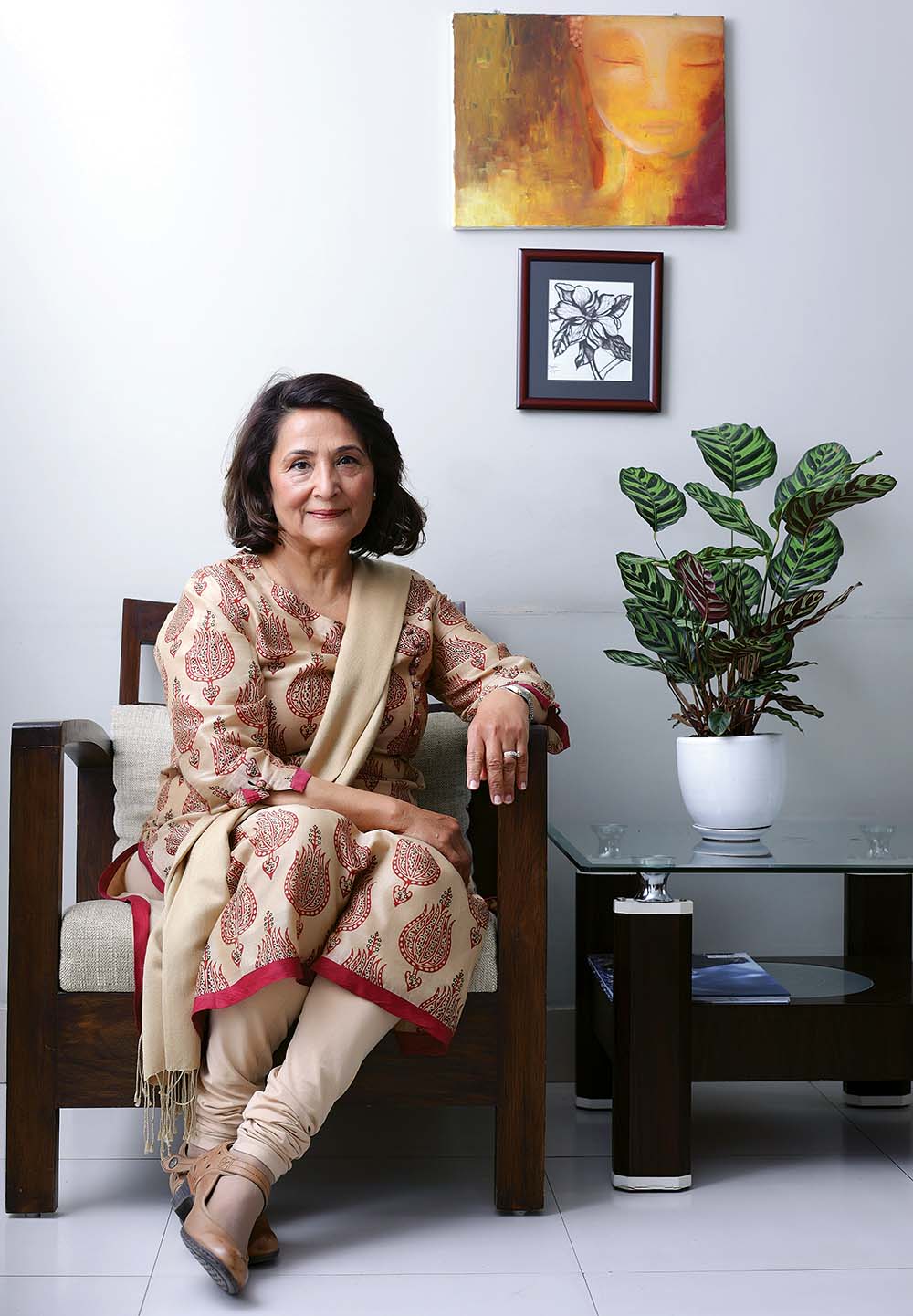
With little hands-on experience in managing a hospital entirely, what is it that has made Dr Devkota successful at UDM-NINAS? “It is all about hard work and resilience, giving your best and never giving up, no matter what,” she shares. She adds that making the conscious decision to pursue a Master’s degree in Health Management even though she had already completed her medical studies has also stood her in good stead. “One thing which is surprising in Nepal is that the higher you move up the ladder, you start getting more management responsibilities,” she shares. “While at Institute of Medicine, I gradually rose to be the head of my department and later worked in various capacities at the dean’s office before being appointed as assistant dean,” she says. This, she says, helped her sharpen her management skills. She adds that running a private institution is a lot easier than managing a government institute. However, there are other aspects that need to be strictly adhered to if one wants to have a properly functioning organisation, she says. Being honest and transparent with the team and believing in them are very crucial for leaders of any establishment. “You must empower them and delegate responsibilities as it is not possible for a single person to be doing everything by themself.” She also emphasises that one must always meet a person at their level and try to enhance one’s likability and credibility. Everyone must be respected and appreciated regardless of their position, she says, emphasising the need to work with empathy. Dr Devkota also stresses the need to be sincere. “No task is small enough to not be done properly.” She elaborates, “Even for mundane things at home I always give my best.” She says her ability to multitask has also helped her tremendously, both in her personal and professional life. A woman may be a thorough professional but somehow the responsibility of raising the children largely falls upon her, she shares. “So, there was a time when I was raising three daughters and looking after my pets at home and simultaneously doing a full-time job at Institute of Medicine while also helping at UDM-NINAS,” she says. At the time she was also doing consultancy work for the government, “I have been very lucky that the health ministry has trusted me time and again and I have been involved in writing around ten health policies.” Even after all these years of relentless work, she mentions, there is always a desire within to grow, and she is the happiest when she can learn something new. “I learn from my daughters and students every day,” she shares, “I derive a lot of energy when I work with young people because they are full of new ideas and new ways of doing things.”"The health policies of our country have all been very well written, but their implementation is weak with no monitoring mechanism. Stringency is only applied in dealing with private sector institutions. If those pre-requisites that are mandated for the private sector are applied to government hospitals, nothing else would be needed."
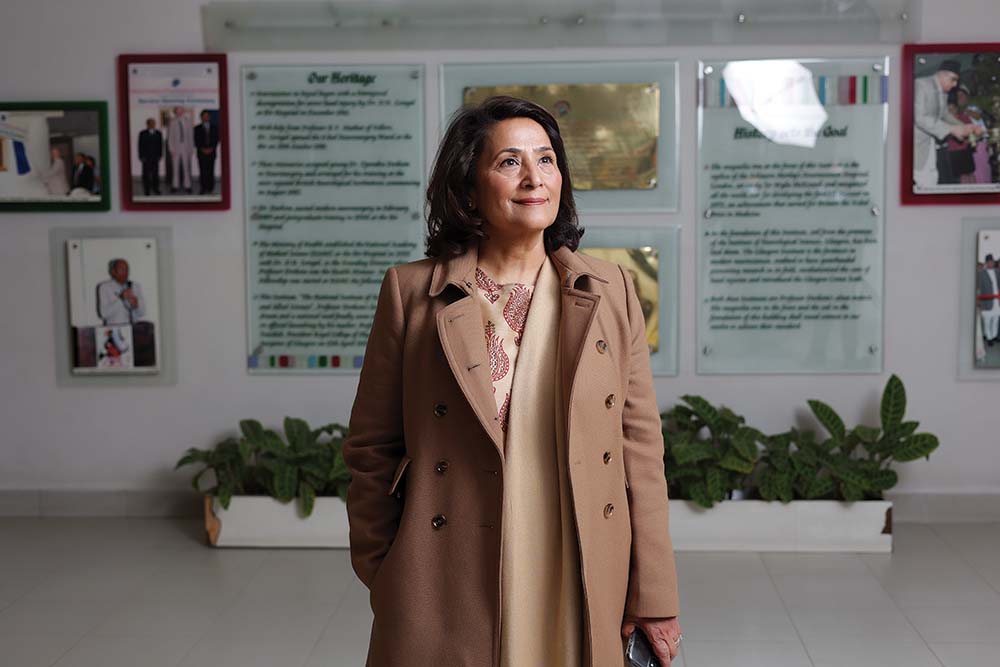 Since the time she took charge of UDM-NINAS, Dr Devkota has focused not only on carrying forward the legacy she inherited but has also introduced some defining changes. She states that she is proud to have introduced the most advanced neuro-interventional services and the first ever biplane cathlab in the country in 2019. It is said that neuro-interventional services are the most advanced technology for addressing problems of strokes and aneurysms and only came about internationally in some developed countries in 2015. “I feel proud we were able to introduce this service which is still not readily available in all parts of the developed world,” she states.
Prior to setting up the cathlab, she also formed a dedicated stroke unit at the hospital which was the first of its kind in the country. “This multidisciplinary team comprises of neurologists, neuro-interventionists, neuro-surgeons, neuro-critical experts, physiotherapy and rehabilitation experts, speech therapists, clinical psychologists and trained nurses who work in tandem to provide comprehensive stroke care at our hospital,” she explains.
To provide better services, Dr Devkota has been trying to upgrade facilities at UDM-NINAS as and when needed, but speaks of her dismay regarding the overall medical sector of the country. She talks about how the health system got so easily overwhelmed exposing its weakness during the Covid pandemic. The country’s population has increased significantly over the years but the health service infrastructure and other resources available, including human resources, are old and obsolete,” she states. She stresses the need for better health workforce planning and placement. “Our opportunity lies in the federal system where the local bodies are responsible for ensuring adequacy of services and resources that have been allocated but I see issues with accountability.”
She adds there has always been a lack of political commitment in implementing health policies. “The health policies of our country have all been very well written, but their implementation is weak with no monitoring mechanism,” she shares. She also rues that stringency is only applied in dealing with private sector institutions. “If those prerequisites that are mandated for the private sector are applied to government hospitals, nothing else would be needed.”
Since the time she took charge of UDM-NINAS, Dr Devkota has focused not only on carrying forward the legacy she inherited but has also introduced some defining changes. She states that she is proud to have introduced the most advanced neuro-interventional services and the first ever biplane cathlab in the country in 2019. It is said that neuro-interventional services are the most advanced technology for addressing problems of strokes and aneurysms and only came about internationally in some developed countries in 2015. “I feel proud we were able to introduce this service which is still not readily available in all parts of the developed world,” she states.
Prior to setting up the cathlab, she also formed a dedicated stroke unit at the hospital which was the first of its kind in the country. “This multidisciplinary team comprises of neurologists, neuro-interventionists, neuro-surgeons, neuro-critical experts, physiotherapy and rehabilitation experts, speech therapists, clinical psychologists and trained nurses who work in tandem to provide comprehensive stroke care at our hospital,” she explains.
To provide better services, Dr Devkota has been trying to upgrade facilities at UDM-NINAS as and when needed, but speaks of her dismay regarding the overall medical sector of the country. She talks about how the health system got so easily overwhelmed exposing its weakness during the Covid pandemic. The country’s population has increased significantly over the years but the health service infrastructure and other resources available, including human resources, are old and obsolete,” she states. She stresses the need for better health workforce planning and placement. “Our opportunity lies in the federal system where the local bodies are responsible for ensuring adequacy of services and resources that have been allocated but I see issues with accountability.”
She adds there has always been a lack of political commitment in implementing health policies. “The health policies of our country have all been very well written, but their implementation is weak with no monitoring mechanism,” she shares. She also rues that stringency is only applied in dealing with private sector institutions. “If those prerequisites that are mandated for the private sector are applied to government hospitals, nothing else would be needed.”
Don’t undermine yourself because the sky is the limit. You just need to be prepared to put in the hours.Dr Devkota is also concerned about the problem of health equity. “However, this problem is not confined to Nepal only. We have seen poor people dying of Covid even in developed nations,” she says, adding economic and social issues are the underlying factors affecting access to services. This, she relates is a globally emerging issue and is being given due priority in recent times. “Having said that, what I have seen in our health sector is that we focus more on access to services and not access to health. Access to services is one part of access to health,” she explains. “For that, we have to address the social determinants. These are factors which influence our opportunities in life depending on where we live, the type of access to education and to other community resources, among others,” she elaborates. Those are grave issues that will take some time to come to fruition, she says, “But what we can focus on now are some simple rules and regulations which could have a bigger impact on the well-being of the society.” Dr Madhu Devkota shares that neuroscience is a field that is advancing each day, so matching the quality and technology of care with the costs involved is of huge concern. She highlights that bringing in more advanced technology is not a problem but technology always comes at a price. “Hence, such services are becoming increasingly expensive but our insurance market has not evolved as expected to cover the expenses of the patients,” she states. If the government and insurance sector paid a little bit more attention, it would be very beneficial for patients who require demanding care, “And this is not fair because a majority of our people are poor and living in challenging circumstances.” She insists that there has to be a proper insurance scheme, especially for speciality services. “I am always internally looking at opportunities on how we can bring down the cost of our services for the less privileged,” she shares, adding that she also tries to work with the government to receive some tax benefits so that the savings can be passed on to the patients. Globally too, the cost of medical care has been rising by 6-7% annually. “I hope I am adequately helped by the government because the services we provide are in high demand but expensive.”
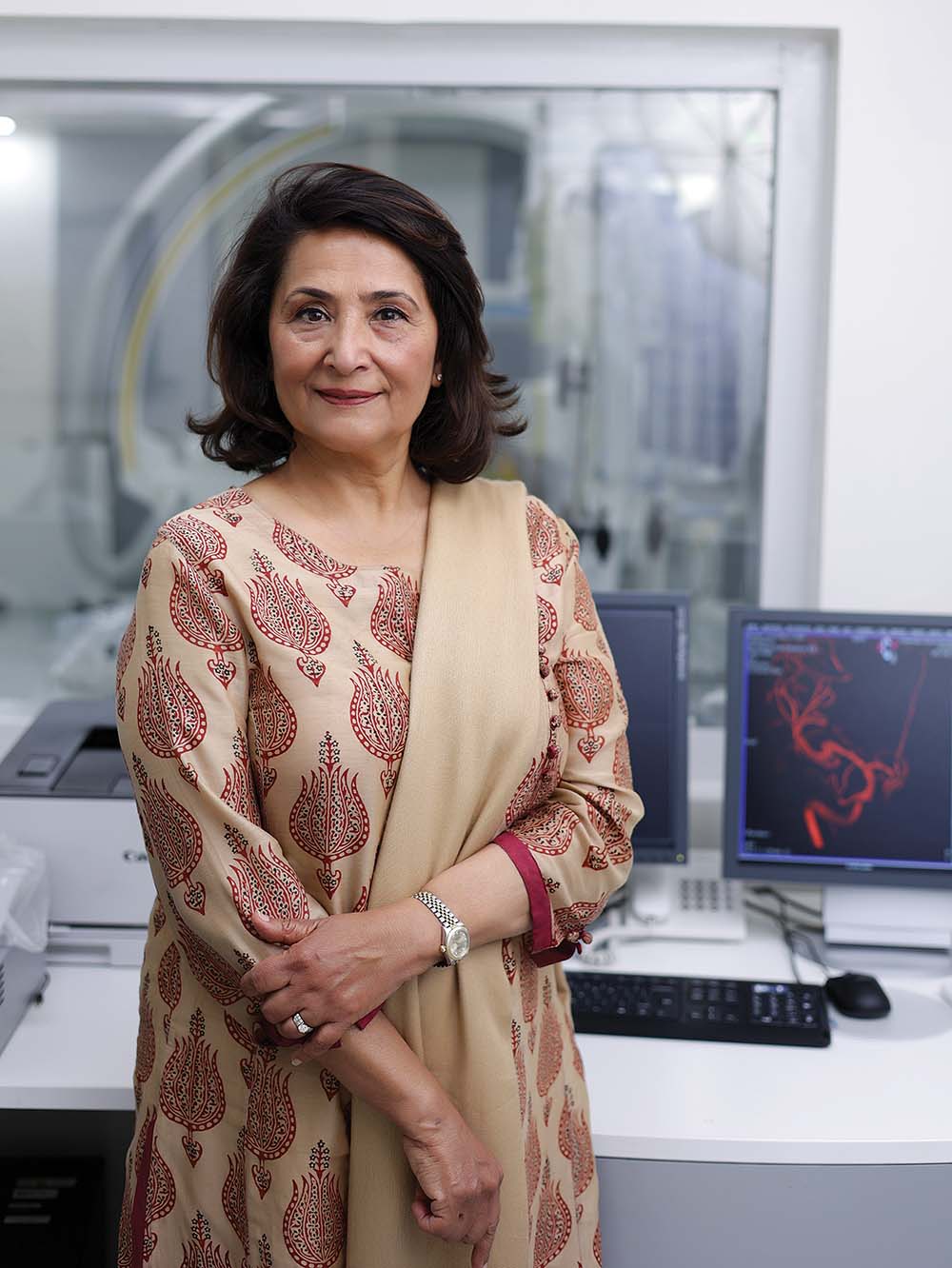 An area that has gone through massive transformation in the medical sector in Nepal, she says, is the patient-doctor relationship. She reminisces over her younger days when doctors were considered demigods and there was literally no dialogue with the patient. The patient always listened to what the doctor had to say and there was no two-way conversation. However, ever since its inception, Dr Devkota states the hospital has always emphasized one-to-one counselling. “The families are partners in the decision-making process, including starting or stopping medications. We want to empower patients and their families so that they can make informed decisions,” she adds. She is also optimistic that the country’s health sector will go through even more positive changes and cites the use of telemedicine which has been gradually gaining traction.
However, the stigma attached to certain diseases is something that still worries Dr Devkota, which again was blatantly visible during the initial months of the outbreak of the Covid pandemic. Education and awareness are the keys, she states.
Delving on the prospects of medical tourism, she mentions the country is blessed with unparalleled beauty. “But in order to start investing in the sector, the most important aspect will be to ensure the necessary infrastructure,” she states. Being a public health person, Dr Devkota personally feels that when the country has not been able to supply enough paracetamol to its people, the idea of providing high-end services for those who can pay does not sit with her. “Here again it is all about the equity gap, otherwise medical tourism could be started,” she shares.
While running the day-to-day operations of the hospital, Dr Devkota faces multiple challenges – some anticipated while others are unknown, and the only way one can prepare for the unknown, she says, is by being mindful and honest in your appreciation of how vulnerable we are. She also believes that when you are willing to listen to others’ voices a lot of problems get resolved. “It is but natural as human beings that when somebody is willing to listen to us then we feel we are being valued,” she says, adding, “Which fundamentally means that the channels of communication must always be open.”
One mantra that Dr Devkota has lived by throughout her personal and professional journey is to always aim high. “Don’t undermine yourself because the sky is the limit. You just need to be prepared to put in the hours.”
READ ALSO:
An area that has gone through massive transformation in the medical sector in Nepal, she says, is the patient-doctor relationship. She reminisces over her younger days when doctors were considered demigods and there was literally no dialogue with the patient. The patient always listened to what the doctor had to say and there was no two-way conversation. However, ever since its inception, Dr Devkota states the hospital has always emphasized one-to-one counselling. “The families are partners in the decision-making process, including starting or stopping medications. We want to empower patients and their families so that they can make informed decisions,” she adds. She is also optimistic that the country’s health sector will go through even more positive changes and cites the use of telemedicine which has been gradually gaining traction.
However, the stigma attached to certain diseases is something that still worries Dr Devkota, which again was blatantly visible during the initial months of the outbreak of the Covid pandemic. Education and awareness are the keys, she states.
Delving on the prospects of medical tourism, she mentions the country is blessed with unparalleled beauty. “But in order to start investing in the sector, the most important aspect will be to ensure the necessary infrastructure,” she states. Being a public health person, Dr Devkota personally feels that when the country has not been able to supply enough paracetamol to its people, the idea of providing high-end services for those who can pay does not sit with her. “Here again it is all about the equity gap, otherwise medical tourism could be started,” she shares.
While running the day-to-day operations of the hospital, Dr Devkota faces multiple challenges – some anticipated while others are unknown, and the only way one can prepare for the unknown, she says, is by being mindful and honest in your appreciation of how vulnerable we are. She also believes that when you are willing to listen to others’ voices a lot of problems get resolved. “It is but natural as human beings that when somebody is willing to listen to us then we feel we are being valued,” she says, adding, “Which fundamentally means that the channels of communication must always be open.”
One mantra that Dr Devkota has lived by throughout her personal and professional journey is to always aim high. “Don’t undermine yourself because the sky is the limit. You just need to be prepared to put in the hours.”
READ ALSO:
Published Date: March 22, 2022, 12:00 am
Post Comments
E-Magazine
RELATED In the Lead


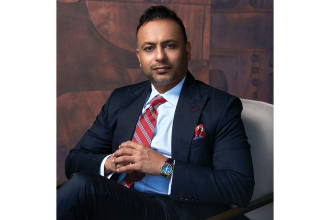
-1767340083.jpg)
